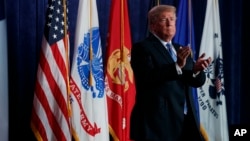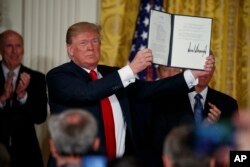President Donald Trump is again pushing his idea to create a “Space Force” as the sixth branch of the U.S. military, stating that “space is becoming very important militarily, as well as other reasons.”
Trump celebrated members of the military in his speech July 3 at the "Salute to Service Dinner" in West Virginia, the evening before the nation’s Independence Day holiday. He said 242 years of America’s independence has “endured because of the sweat, blood, and sacrifice of the American armed forces,” before adding that his administration “may add a little thing called Space Force,” and he is “thinking very seriously about it.”
Trump first announced on June 18 at the White House he is directing the Pentagon to create the Space Force as an independent service branch aimed at ensuring American supremacy in space. He pledged to reclaim U.S. leadership in space, framing it as a national security issue, saying he does not want "China and Russia and other countries leading us."
The idea of a Space Force was first floated in March when the president said his new national security strategy recognizes that space is a theater of war, while addressing service members in California. Trump said he had first coined the term as a joke, while discussing U.S. government spending and private investment in space.
Varied reactions
The announcement of the creation of a Space Force has prompted a wide range of reactions — from memes ridiculing the proposal, to serious debate from experts.
Angelo Codevilla, professor emeritus of International Relations at Boston University and staff member of the Senate Intelligence Committee in the 1980s, applauded the idea in an opinion piece published in The Hill news website. He said the establishment of the Space Force would “endow people with the will and interest to make U.S. control of space happen.”
Codevilla argued that “any major war’s operations would involve competitive destruction of satellites” and that sooner or later, “some power will bid for the comprehensive capacity to control orbital space. Better that America be first.”
In a blog for the Brookings Institution, Michael O’Hanlon, Senior Fellow at the institution’s Center for 21st Century Security, agreed satellites play an important role in modern warfare, but he said “space technologies and operations have a good home already in the Air Force” and the “weight of initial evidence tilts fairly strongly against” the need for a separate branch.
‘Separate, but equal’
In his June 18 announcement, Trump said the Air Force and the Space Force will be "separate, but equal,” and he directed Gen. Joseph Dunford, Chairman of the Joint Chiefs of Staff, to "carry that assignment out."
The Air Force has argued space defense is within its capacity and a new branch could dilute efforts to extend American military might into space. In a June 19 memo, General David Goldfein, Air Force chief of staff, reassured airmen that drastic changes will not occur. “Our focus must remain on the mission as we continue to accelerate the space warfighting capabilities required to support the National Defense Strategy.”
Defense Secretary Jim Mattis said the creation of a Space Force will require legislation from Congress, plus “a lot of detailed planning we’ve not yet begun.”
In June 2017, Trump signed an executive order to revive the National Space Council, an advisory group that existed from 1989 to 1993 under the administration of George H.W. Bush. The council is a modified version of the National Aeronautics and Space Council created in 1958 by then-president Dwight Eisenhower, to ensure national policy coordination on space.
Council members include the secretaries of State, Defense, Commerce, Transportation, Homeland Security, the NASA administrator and the chairman of the Joint Chiefs of Staff. Trump appointed Vice President Mike Pence as the council’s chairman.
Discussions have not yet begun on how much funding will be allocated on the Space Force proposal. In December 2017, Trump signed a budget authorizing $696 billion in defense spending.
The United States leads the world in military spending.






